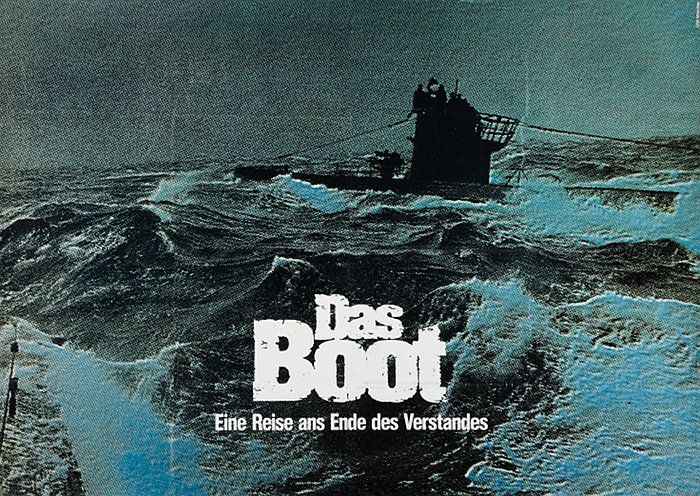
The Best War Movie Of All Time: Das Boot (1981)
Director: Wolfgang Petersen
Germans had a historical collective TV experience when Wolfgang Petersen’s Das Boot (1981) was aired as an extended 6-episode (360min) TV-series in 1985 and turned German living rooms into claustrophobic WWII U-boats. Basically every German who was old enough at that time watched the series and was confronted with the true nature and horrors of war on a highly uncomfortable and physical level.
Das Boot is different than other war films since it does not show the usual combat battles on land or technological cockpit firefights in the air, but literally takes place in the invisible and unglorifiable underground: below the sea-level. The film is modelled after true events in the fall of 1941 during WW2: in the “Battle of the Atlantic”, 40000 men were sent out in German U-boats to destroy British shipping and severe the supply lines of the enemy. 30000 of them never returned. Das Boot is the story of 42 such men. It is a story of ultimate decay.
The long beginning scene of Das Boot shows the recruits celebrating their last night before they set sail. In classic sailor manner, they are carelessly drinking, dancing and singing in a brothel one last time before entering the U96 and descending into claustrophobic hell. This scene at Bar Royal doesn’t leave you throughout the film in the course of which these young men’s hope, joy, and memories give way to boredom and then fear, to a complete psychological and physical decline. The men suffer from filth, poor hygiene, rashes and other untreated diseases, and they lose their sanity in the merciless claustrophobia of the submarine, all under the eyes of a captain who has Weltschmerz in his gaze. Here, the film also works also on a meta-level. The actors in the film almost all became big names in German film or music, names who are established in the country’s cultural scene to this day- Jürgen Prochnow, Herbert Grönemeyer (Grönland label), Uwe Ochsenknecht, Claude Oliver Rudolph and many others. One cannot help but wonder how many such would-be talents perish in every war.
The viewer does not see the enemy threat in Das Boot, but he plunges into an acoustic horror scenario with the submarine crew, an unbearable soundscape of beeps, roaring, and deafening creaks, sounds that are also reflected in Klaus Doldinger’s congenial theme. It is only these beeps that announce the presence of the enemy and danger, with the sounds working as an electric taser which is driving the viewer whose eyes are glued to the moving needle on the submarine’s pressure gauge. The action and plot is not what’s important about Das Boot, important is that the men of the U96 are scared to death and in a state of sheer terror. At one point, the German submarine has sunk into the depths of the North Atlantic, the lights have gone out, and the pursuers are floating somewhere above and are dropping their bombs into the water.
Make sure to go for the original uncut version / director’s cut and avoid the shortened theatrical version of Das Boot, a Hollywood version where the concentration on special effect scenes reverse the anti-war message of the original. Yet still, the film has been criticized by some for having no such message or political quality at all- apparently every German WW2 movie has to be something like Schindler’s List or otherwise it’s under suspicion to be a glorification of the war. But the film has one very important political scene when the U96 gets resupply from the SS Weser, a ship full of Nazi functionaries. They welcome the battered submarine crew with polished uniforms and tables overflowing with fruit and food; theirs is a land of milk and honey. And although they never tire of praising them for their patriotic service after making the “Heil Hitler!” salute, the obscene parallel world in which they live reveals itself. It is the confrontation between real soldiers and a ruling bureaucratic elite that controls the destinies of all these men with no compassion.
Das Boot is not the story of Hitler or the Third Reich. It is also not a narrative about the enemy country and its “savage” jungles which suggestedly inevitably drive you crazy, like in Apocalypse Now. Das Boot is the story of young men being used as cannon fodder as if their mothers gave birth to them for this purpose. Men who are abused and consumed for a patriotic narrative in which they have no voice or saying, but in which a ruling elite and their bureaucratic helpers in the Departments of War and press organs determine their fates, and sink them.
by Saliha Enzenauer

[…] Boot” is a German-language movie with subtitles, but it’s regarded by some as the best war movie ever made, and certainly one of the best sub movies ever made. “Das Boot” […]